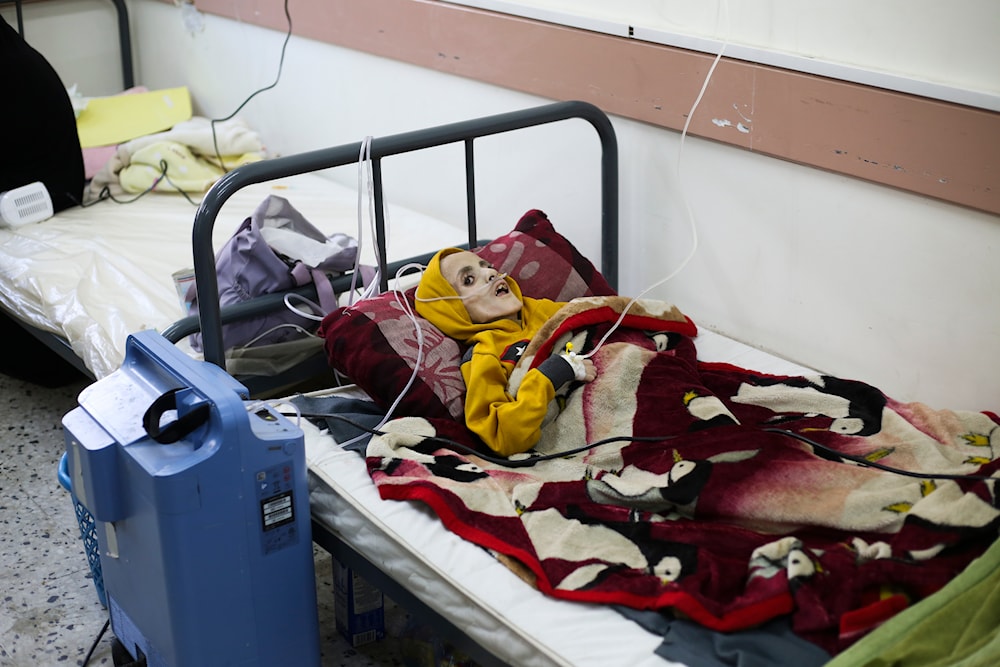'Israel' on fastest starvation campaign in Gaza in modern history: UN
International condemnation of Israeli actions in Gaza mounts, with UN special rapporteurs and humanitarian organizations warning of dire consequences.
-

A 10-year-old Palestinian boy, Yazan al-Kafarna, who was born with cerebral palsy, lying in a hospital in Rafah, on March 3, 2024, and later dying due to what his doctor said was extreme muscle wastage caused primarily by a lack of food (AP)
The UN special rapporteur on the right to food has issued a stark warning, stating that "Israel" is waging an unprecedentedly swift campaign of starvation in Gaza, calling it “the fastest in modern history.”
“How is Israel able to starve 2.3 million people so quickly and so completely?” Michael Fakhri questioned during a joint press briefing in Geneva alongside other UN special rapporteurs.
“This is the fastest starvation campaign in modern history,” he reiterated, highlighting the severe impact of "Israel’s" blockade, which has cut off all humanitarian aid from entering Gaza.
Fakhri further stressed, “This is not a ceasefire by any definition. This is a slowing down of military violence, but … unfolding of death through starvation.”
In the same vein, Francesca Albanese, the UN special rapporteur on human rights in the occupied Palestinian territories, warned that even if the violence were to stop today, “the genocide will continue because there are no ways to remedy the destruction” that has already been inflicted.
She also cautioned that “the genocidal violence is leaking out in the West Bank,” describing the current level of violence as “as acute as ever.” Expressing frustration with the lack of action, she added, “I don’t know how many warnings the international community will need … We will miss human rights very much when they are no longer able to protect us.”
On his part, Ben Saul, the UN special rapporteur on human rights protection, condemned US President Donald Trump’s plan to relocate Gaza’s population, stating, “It would shatter the most fundamental rules of international order and the United Nations Charter since 1945.”
“It’s manifestly illegal to invade and annex foreign territory by force, to forcibly deport its population and to deprive the Palestinian people of their right to self-determination,” Saul asserted, emphasizing that any future plans for Gaza must align with the will of the Palestinian people, including under any Arab-led proposal.
He also denounced "Israel’s continuing illegal military provocation in the wider region,” warning of broader destabilization.
MSF slams 'Israel' for weaponizing humanitarian aid
In a similar context, Doctors Without Borders (MSF) denounced "Israel’s use of aid as a tool of war in Gaza,” condemning the ongoing blockade that deprives Palestinian civilians of essential resources, including water and electricity.
In a statement, MSF said it “strongly condemns” the Israeli-imposed siege, accusing Israeli authorities of employing “collective punishment” and “instrumentalising humanitarian needs by using it as a bargaining chip” amid ceasefire negotiations.
“Israeli authorities are yet again normalising the use of aid as a negotiation tool. This is outrageous. Humanitarian aid should never be used as a bargaining chip in war,” said Myriam Laaroussi, MSF’s emergency coordinator.
Laaroussi further warned, “A ceasefire without scaling up humanitarian aid is contradictory,” stressing that MSF’s ability to operate would be severely restricted without fuel supplies.
The organization urged Israeli authorities to “respect international humanitarian law and uphold its responsibilities as an occupying power” by ending the blockade.
MSF also called on "Israel’s" allies, who have “ignored this grave violation of international humanitarian law,” to “refrain from normalising such actions” and take action “to prevent Gaza from plunging further into devastation.”
This is happening as the International Court of Justice (ICJ) has announced it will begin hearings on "Israel's" humanitarian obligations to Palestinians in The Hague on April 28.
The hearings follow a UN General Assembly resolution passed in December, which requests an advisory opinion from the ICJ on this issue. The resolution, adopted after "Israel's" decision to ban the UN agency for Palestinian refugees (UNRWA), urges the ICJ to clarify "Israel’s" responsibility in "ensuring and facilitating the unhindered provision of urgently needed supplies essential to the survival of the Palestinian civilian population."
While ICJ rulings are legally binding, the court lacks the means to enforce them.
Read next: States, int'l bodies decry Israeli halt of Gaza aid, demand its flow

 4 Min Read
4 Min Read










